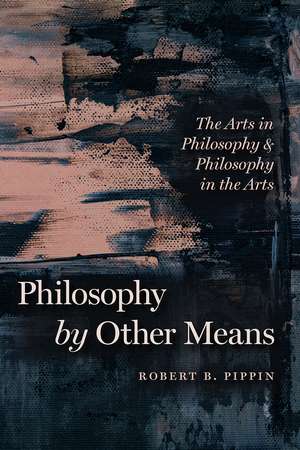Philosophy by Other Means: The Arts in Philosophy and Philosophy in the Arts
Autor Robert B. Pippinen Limba Engleză Paperback – 26 mai 2021
The arts hold a range of values and ambitions, offering beauty, playfulness, and craftsmanship while deepening our mythologies and enriching the human experience. Some works take on philosophical ambitions, contributing to philosophy in ways that transcend the discipline’s traditional analytic and discursive forms. Pippin’s claim is twofold: criticism properly understood often requires a form of philosophical reflection, and philosophy is impoverished if it is not informed by critical attention to aesthetic objects. In the first part of the book, he examines how philosophers like Kant, Hegel, and Adorno have considered the relationship between art and philosophy. The second part of the book offers an exploration of how individual artworks might be considered forms of philosophical reflection. Pippin demonstrates the importance of practicing philosophical criticism and shows how the arts can provide key insights that are out of reach for philosophy, at least as traditionally understood.
| Toate formatele și edițiile | Preț | Express |
|---|---|---|
| Paperback (1) | 207.80 lei 22-36 zile | +15.67 lei 6-12 zile |
| University of Chicago Press – 26 mai 2021 | 207.80 lei 22-36 zile | +15.67 lei 6-12 zile |
| Hardback (1) | 607.03 lei 43-57 zile | |
| University of Chicago Press – 11 mai 2021 | 607.03 lei 43-57 zile |
Preț: 207.80 lei
Nou
Puncte Express: 312
Preț estimativ în valută:
39.77€ • 41.36$ • 32.83£
39.77€ • 41.36$ • 32.83£
Carte disponibilă
Livrare economică 24 martie-07 aprilie
Livrare express 08-14 martie pentru 25.66 lei
Preluare comenzi: 021 569.72.76
Specificații
ISBN-13: 9780226770802
ISBN-10: 022677080X
Pagini: 304
Ilustrații: 7 halftones
Dimensiuni: 152 x 229 x 18 mm
Greutate: 0.41 kg
Ediția:First Edition
Editura: University of Chicago Press
Colecția University of Chicago Press
ISBN-10: 022677080X
Pagini: 304
Ilustrații: 7 halftones
Dimensiuni: 152 x 229 x 18 mm
Greutate: 0.41 kg
Ediția:First Edition
Editura: University of Chicago Press
Colecția University of Chicago Press
Notă biografică
Robert B. Pippin is the Evelyn Stefansson Nef Distinguished Service Professor at the University of Chicago. He is the author of Henry James and Modern Moral Life, After the Beautiful, several books on modern German philosophy, and five books on film and philosophy, most recently, Filmed Thought: Cinema as Reflective Form, also published by the University of Chicago Press.
Cuprins
Part One: The Arts in Philosophy
1. Philosophical Criticism
2. Kant and the Problem of Tragedy
3. The Status of Literature in Hegel’s Phenomenology of Spirit: On the Lives of Concepts
4. The Absence of Aesthetics in Hegel’s Aesthetics
5. Hegel on Painting
6. Authenticity in Painting: Remarks on Michael Fried’s Art History
7. Photography as Art: Fried and Intention
8. Adorno, Aesthetic Negativity, and the Problem of Idealism
Part Two: Philosophy in the Arts
9. On Maisie’s Knowing Her Own Mind
10. Subjectivity: A Proustian Problem
11. The Shadow of Love: The Role of Jealousy in Proust’s À la recherche du temps perdu
12. The Paradoxes of Power in the Early Novels of J. M. Coetzee
13. Philosophical Fiction? On J. M. Coetzee’s Elizabeth Costello
Acknowledgments
Works Cited
Index
1. Philosophical Criticism
2. Kant and the Problem of Tragedy
3. The Status of Literature in Hegel’s Phenomenology of Spirit: On the Lives of Concepts
4. The Absence of Aesthetics in Hegel’s Aesthetics
5. Hegel on Painting
6. Authenticity in Painting: Remarks on Michael Fried’s Art History
7. Photography as Art: Fried and Intention
8. Adorno, Aesthetic Negativity, and the Problem of Idealism
Part Two: Philosophy in the Arts
9. On Maisie’s Knowing Her Own Mind
10. Subjectivity: A Proustian Problem
11. The Shadow of Love: The Role of Jealousy in Proust’s À la recherche du temps perdu
12. The Paradoxes of Power in the Early Novels of J. M. Coetzee
13. Philosophical Fiction? On J. M. Coetzee’s Elizabeth Costello
Acknowledgments
Works Cited
Index
Recenzii
" [A] marvellous, labyrinthine book."
"Philosophers weary of banal abstraction will find fresh sources of inspiration within Pippin’s poetic importations... Pippin makes a strong case not only for a philosophic reading of art, but also for an artistic reading of philosophy."
“This collection of essays addresses the perennial question of the relation between philosophy and aesthetic criticism with cogency and originality. It’s hard to think of anyone better qualified to explore this question, as Pippin has made major contributions both to the study of modern German philosophy and to philosophical approaches to aesthetic objects, notably painting, literary fiction, and film.”
“When seeking to bring together two distinct practices or disciplines it is all too easy to confuse them or lose sight of what is most interesting about each. Pippin avoids this fate with remarkable grace and precision. His philosophical questions illuminate literature and art, and his interpretations of particular works invite a philosophical connection without depending on it. A wonderful, infinitely interesting project.”
“These essays display the enormous range of Pippin’s intelligence as a commentator on philosophy and literature. Whether as an expounder of Hegel’s aesthetics or an interpreter of self-knowledge in What Maisie Knew, he offers discoveries that always reward the attention he demands.”
"Artworks are neither aesthetically rendered content ripe for philosophical articulation at a later stage, nor mere particulars resisting interpretation, but are revealed here as the friction that any thinking needs to make its concepts come alive for us. In this way, this book offers the finest compliment philosophy could give to art, not by defining it or grasping it in a comprehensive theory, but by engaging it and letting it offer us something to understand, again and again."
"The book should likewise prove a rewarding read for those working in the field of literature and philosophy more generally, as Pippin treats the literary more seriously and with greater precision than just about any other contemporary American philosopher."
